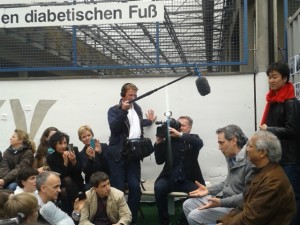As my three months in the Netherlands is completed, I have reflected on my experience in connecting with over 150 social entrepreneurs and 50 pipeline partners. Mapping the social entrepreneur space in a foreign country from scratch creates a great sense of fulfillment and I would like to share some of the key highlights I have learned in terms of sourcing for pipeline.
1) The Impact Space is Tight Knit
In the sphere of social enterprises in the Netherlands, everybody seems to know everybody. Most of the people I have engaged with usually refer back to the same organizations that support and grow social ventures (including the Village Capital partner organizations). In this sense, there is a very collaborative approach and many individuals I have connected with see that the different organizations are essentially working to achieve the same thing (creating positive impact) in different ways. Communicating this message really helps focus on the positive overlaps between all the organizations and foster a mindset of working together to help each other out.
2) Partner Up and Down the Supply Chain
In connecting with pipeline partners to refer new social entrepreneurs, I have found that working with partner organizations both up and down the supply chain of sourcing social entrepreneurs has been very useful. For example, business competitions are a great downstream partner as the ventures who take part in certain competitions are usually at an ideal post-revenue and proof-of-concept stage ready for the next level of scaling. On the other hand, an upstream partner may be a larger investor who makes Series A investments but also receives proposals from ventures who may be more suitable for seed stage financing and relevant to the Village Capital program. The great thing about working with partners across the supply chain is that you can easily return the favor to your partners and pass on candidates in your pipeline who are more suitable either up or down the supply chain.
3) Engage with Partners to Spread the Word
In addition to pipeline partners, partners who could help spread the word through their social media are great ways to gain more traction and reach out to entrepreneurs outside of your network. These do not necessarily have to be typical PR partners – for example Ethical Property Nederland is currently developing a working space for entrepreneurs (Mundo Den Haag), non-profits and NGOs and has helped post up the call for social entrepreneurs in their blog and Facebook page. One Penny Entrepreneur (an online platform for startups to help each other and raise social capital) has published an interview on their blog about the Village Capital programs.
4) Source Unconventional Opportunities
There is no standard protocol of reaching out. Beyond cold calling and attending events, one of the most enjoyable parts of sourcing is being creative about it. A great example of this is that many larger scale events and conferences are usually expensive to attend and / or get to. However, these are great opportunities to meet others with the same interests. One such event was the SenseCamp Europe, a one day bar camp for social entrepreneurs held in Wiesbaden, Germany. I was generously supported to attend through a British Council Germany travel grant and wrote about the experience in a blog on their website. It was a great way to spread the word of Village Capital to entrepreneurs from Germany and across Europe who attended.
A Note of Thanks
I would like to extend my gratitude to all those who made this experience in the Netherlands possible: Village Capital, the Monterey Institute of International Studies and the Frontier Market Scouts program, our local partners in the Netherlands, pipeline partners, conversation facilitators and of course, the social entrepreneurs who are doing so much great work to solve pressing global challenges through innovative solutions.




